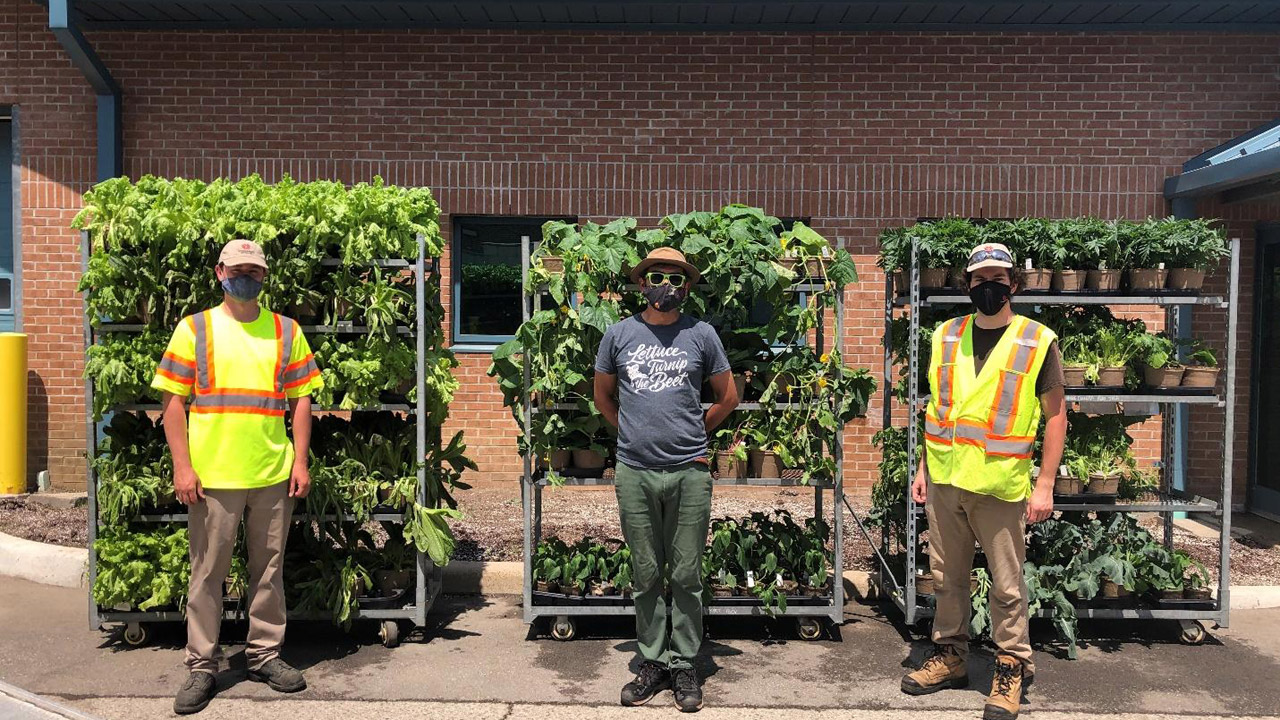Fanshawe students donate vegetables to low-income families
 CREDIT: JEFF ROWLEY
CREDIT: JEFF ROWLEYLuise Reyes (center) from the London Food Bank picking up his order from second year students James Southern (left) and Evan Pacheco (right). Luis is ecstatic about the crop and is extremely grateful for Fanshawe's assistance.
Second year Fanshawe College students of the horticulture technician program have grown and donated vegetables to the London Food Bank.
Professors Jeff Rowley and Jeff Hicks, along with and program coordinator Matt Hart are the key leaders in charge of the London Food Bank project at Fanshawe College.
“Over the years, our students have traditionally been involved with community volunteer projects (tree planting on Veterans Memorial Parkway or removing invasive species on properties maintained by the Talbot Land Trust),” said Hart. “This type of in-person community involvement was not possible during the pandemic, so we thought this would be a great way for the students to help in the community without having to travel in-person.”
The process began in January and by May, plants and vegetables were ready to be distributed. Jeff Rowley is a professor that has been involved with the horticulture technician’s program since 2006. Rowley is substituting for Jeff Hicks to undertake the London Food Bank project as part of the Greenhouse Production class. This class enables students to participate in the manufacturing and promotion of greenhouse crops. The students are encouraged to explore different forms of vegetation and are not limited to specific crops.
Some notable crops grown by students include herbs, spinach, hydrangeas, and poinsettias.
The department and students of this program felt the significance of more purposeful vegetation during the pandemic. Rowley briefly mentioned the motivation amongst students as they worked with intent and a desire to help the community during this challenging time.
“There is a shift in terms of their attitude, the younger generation, they have more of a drive to be sustainable and providing crops that have more of a purpose like feeding people,” said Rowley.
He added that he was eager to continue projects like these to help those in distressed situations.
“We are hoping to contribute to this more often,” said Rowley. “Even in the fall semester, we can start growing various types of vegetables that the tree has grown, such as kale, herbs, spinach, and stuff like that. I think it is something that we want to do year round because we understand the need for food at the London Food Bank. They’re pretty much always in need of large quantities in food. It is kind of a win-win scenario that we help people that are in need.” Due to the COVID-19 pandemic, many classes at Fanshawe College were delivered virtually with minimal in-person classes in the 2020/2021 school year. The horticulture technician’s program encompasses more hands-on skills, therefore, students of the program were mainly on-campus during the emergency lockdown. Hart noted the various locations on-campus where the students work.
“Our students do most of their practical learning on-campus in our beautiful botanical gardens,” he said. “Main campus and Cuddy Gardens in Strathroy make up ‘The Gardens of Fanshawe’ and provide a great place for our students to practice their hands-on skills. Fanshawe has a modern Greenhouse facility where the vegetables were grown through the winter months.” The aim of the horticulture department at Fanshawe is to expose and engage learners to a wide-range of horticulture and landscape practices. The faculty hopes to help students find their specific areas of passion allowing them to become successful in the industry.
“I hope that [students] leave with a very solid knowledge base of horticulture and a direction of where they want to go,” explained Rowley. “With Horticulture, there’s many different avenues. You could work in greenhouses, in retail, wholesale, landscape construction, design, landscape maintenance, and many more. I hope students find that niche that they want to follow.” Rowley further explained that some students are even interested in being charitable and resourceful, including being a part of innovations in healthcare.
He takes great pride in the work of his students as their work is showcased on campus through landscape construction, interlocking paving, plant layout, installation, and design. He hopes the program will appeal to anyone who loves nature, has a desire to be creative, and wants to make a difference.















